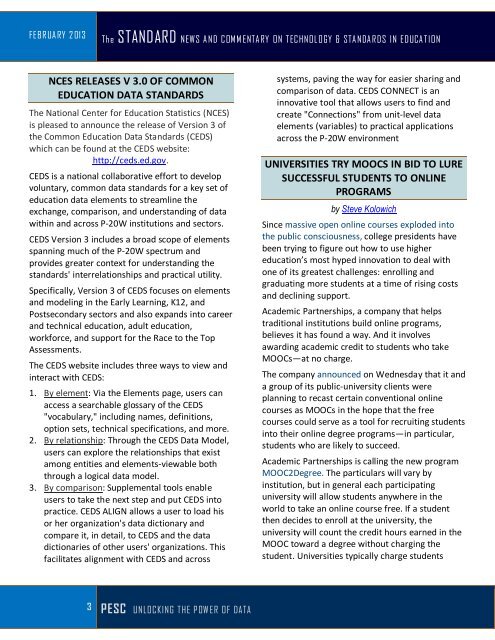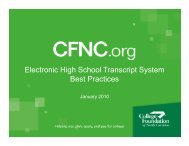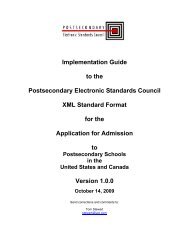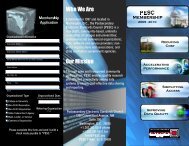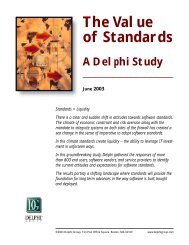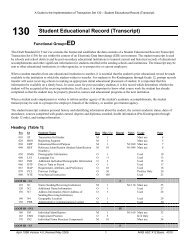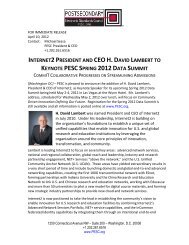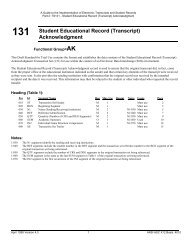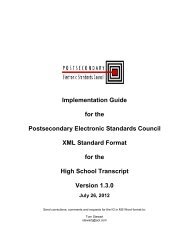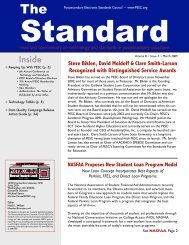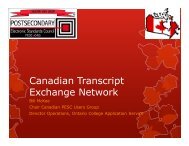February 2013 - PESC
February 2013 - PESC
February 2013 - PESC
Create successful ePaper yourself
Turn your PDF publications into a flip-book with our unique Google optimized e-Paper software.
FEB RUA RY 2 013<br />
Th e STANDARD NEWS A ND C OM M ENTA RY ON T EC HNOL OGY & STA NDA RDS IN EDUCA T ION<br />
NCES RELEASES V 3.0 OF COMMON<br />
EDUCATION DATA STANDARDS<br />
The National Center for Education Statistics (NCES)<br />
is pleased to announce the release of Version 3 of<br />
the Common Education Data Standards (CEDS)<br />
which can be found at the CEDS website:<br />
http://ceds.ed.gov.<br />
CEDS is a national collaborative effort to develop<br />
voluntary, common data standards for a key set of<br />
education data elements to streamline the<br />
exchange, comparison, and understanding of data<br />
within and across P-20W institutions and sectors.<br />
CEDS Version 3 includes a broad scope of elements<br />
spanning much of the P-20W spectrum and<br />
provides greater context for understanding the<br />
standards' interrelationships and practical utility.<br />
Specifically, Version 3 of CEDS focuses on elements<br />
and modeling in the Early Learning, K12, and<br />
Postsecondary sectors and also expands into career<br />
and technical education, adult education,<br />
workforce, and support for the Race to the Top<br />
Assessments.<br />
The CEDS website includes three ways to view and<br />
interact with CEDS:<br />
1. By element: Via the Elements page, users can<br />
access a searchable glossary of the CEDS<br />
"vocabulary," including names, definitions,<br />
option sets, technical specifications, and more.<br />
2. By relationship: Through the CEDS Data Model,<br />
users can explore the relationships that exist<br />
among entities and elements-viewable both<br />
through a logical data model.<br />
3. By comparison: Supplemental tools enable<br />
users to take the next step and put CEDS into<br />
practice. CEDS ALIGN allows a user to load his<br />
or her organization's data dictionary and<br />
compare it, in detail, to CEDS and the data<br />
dictionaries of other users' organizations. This<br />
facilitates alignment with CEDS and across<br />
systems, paving the way for easier sharing and<br />
comparison of data. CEDS CONNECT is an<br />
innovative tool that allows users to find and<br />
create "Connections" from unit-level data<br />
elements (variables) to practical applications<br />
across the P-20W environment<br />
UNIVERSITIES TRY MOOCS IN BID TO LURE<br />
SUCCESSFUL STUDENTS TO ONLINE<br />
PROGRAMS<br />
by Steve Kolowich<br />
Since massive open online courses exploded into<br />
the public consciousness, college presidents have<br />
been trying to figure out how to use higher<br />
education’s most hyped innovation to deal with<br />
one of its greatest challenges: enrolling and<br />
graduating more students at a time of rising costs<br />
and declining support.<br />
Academic Partnerships, a company that helps<br />
traditional institutions build online programs,<br />
believes it has found a way. And it involves<br />
awarding academic credit to students who take<br />
MOOCs—at no charge.<br />
The company announced on Wednesday that it and<br />
a group of its public-university clients were<br />
planning to recast certain conventional online<br />
courses as MOOCs in the hope that the free<br />
courses could serve as a tool for recruiting students<br />
into their online degree programs—in particular,<br />
students who are likely to succeed.<br />
Academic Partnerships is calling the new program<br />
MOOC2Degree. The particulars will vary by<br />
institution, but in general each participating<br />
university will allow students anywhere in the<br />
world to take an online course free. If a student<br />
then decides to enroll at the university, the<br />
university will count the credit hours earned in the<br />
MOOC toward a degree without charging the<br />
student. Universities typically charge students<br />
3 <strong>PESC</strong> UNLOC K ING T HE P OW ER OF DATA


